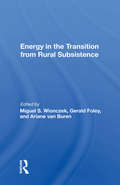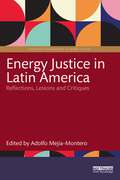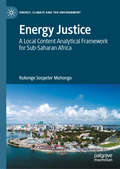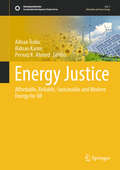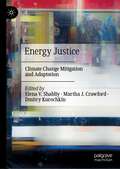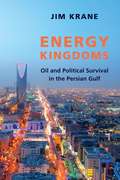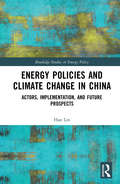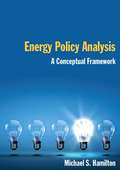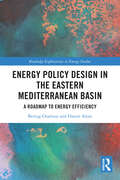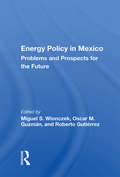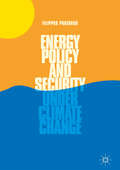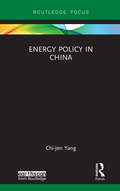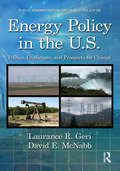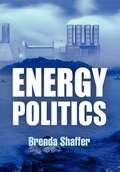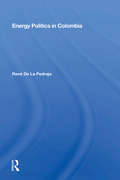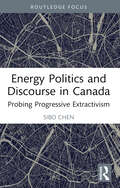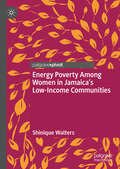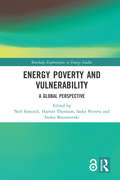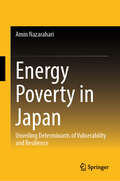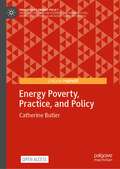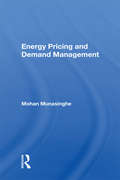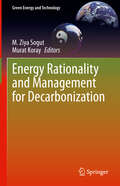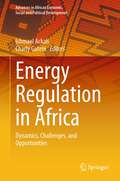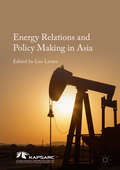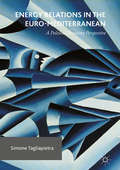- Table View
- List View
Energy In The Transition From Rural Subsistence
by Miguel S. Wionczek Gerald Foley Ariane Van BurenFor the half of the world's population still dependent on wood and other traditional fuels for basic cooking and heating needs, a serious supply crisis is emerging: forests are disappearing and population pressure on other energy sources is mounting. This book analyzes the energy problems of those caught in the trap of rural subsistence and explores the role energy might play in the transition away from subsistence. It includes eight specially commissioned studies of different developing countries and a review of the small-scale energy technologies presently available for rural use.
Energy Justice in Latin America: Reflections, Lessons and Critiques (Routledge Explorations in Energy Studies)
by Adolfo Mejía-MonteroThis book presents valuable insights, critiques and contributions from energy researchers focused on Latin American case studies. Their work not only enriches the understanding of energy justice but also addresses a significant gap in the current academic literature.Since it was coined as an academic term more than ten years ago, energy justice has experienced accelerated growth as a relevant and widely recognised concept that allows energy researchers to engage with diverse energy issues. Nevertheless, energy justice still faces theoretical and empirical gaps, including a lack of diversity in author demographics and case studies coming from regions in the Global South. Against this backdrop, this book brings together 30 authors whose research draws from Latin American countries like Argentina, Brazil, Bolivia, Chile, Costa Rica, Ecuador, Mexico, Panama and Peru, as well as wider regional perspectives. The selected case studies combine low‑carbon transitions, regulations and technologies with issues of gender, indigeneity, (neo)colonialism, autonomy, poverty and inequality. Importantly, the chapters examine how energy justice might influence existing approaches and worldviews on sustainability, which strive for just and clean future energy systems by redressing regional inequalities and tackling the global challenge of climate change. As such, Energy Justice in Latin America opens new spaces for a growing research community to redefine and jointly construct a more complete, regionally specific notion of energy justice.Highlighting the ways in which the discussion included in this book resonates with other regions in the Global South, this volume will be of great interest to students and scholars of energy justice, energy poverty, energy democracy and energy policy, as well as Latin American studies more broadly.
Energy Justice: A Local Content Analytical Framework for Sub-Saharan Africa (Energy, Climate and the Environment)
by Rukonge Sospeter MuhongoThis book explores local content policies and their role in natural resource management within the realm of energy justice. Based on several country case studies it discusses the role of regional integration for such policies in Sub-Saharan Africa. Energy justice has been widely applied across different aspects of development, but here the principles of justice are specifically integrated with the management and implementation of oil and gas projects. Such an analysis offers novel means of implementing policies in local regions, moving away from a one-size fits all approach that leads to the ineffective transplantation of policies from developed economies to developing Sub-Saharan economies. The book argues that with a regional approach, Sub-Saharan Africa can leverage natural resources, industrial parks, supplier clusters, regional financing mechanisms and regional training facilities which would drive down the costs of production, increase efficiency and integrate the local Sub-Saharan population into the oil and gas industry. This would result in the benefits as well as the environmental concerns and responsibilities intrinsic to these industries, being spread more equally amongst local and none local stakeholders. This book will be a valuable resource for scholars and students as well as policy makers and practitioners in the areas of extractive industry-related disciplines energy governance, and economic development in Africa.
Energy Justice: Affordable, Reliable, Sustainable and Modern Energy for All (Sustainable Development Goals Series)
by Adnan Trakic Pervaiz K. Ahmed Ridoan KarimThis book delves into the pressing issue of energy justice as it relates to SDG 7 and its far-reaching implications for society. With a comprehensive exploration of various aspects, from reducing energy burdens to political considerations, environmental justice, and human rights, this thought-provoking collection of chapters offers a profound understanding of the challenges and potential solutions surrounding energy justice. Starting with an introduction to the concept of energy justice and its significance, the editors lay the groundwork for an engaging discourse. The book then delves into the disproportionate energy burdens faced by low-income communities, shedding light on the difficult choices they must make to meet their basic needs. It further examines the intricate interplay between energy justice, politics, and environmental concerns, striving to find a harmonious balance. Drawing from a diverse range of perspectives, the chapters explore the intersection of energy justice with human rights, analyzing its implications for countries worldwide. The book also investigates the influence of disruptive events on renewable energy programs, presents an Islamic perspective on energy justice, and highlights the roles of the financial sector, fossil fuel industry, nuclear energy sector, and energy technology innovation in mitigating energy injustice. Chapter 'The Role of the Financial Sector in Energy Justice' is available open access under a Creative Commons Attribution 4.0 International License via link.springer.com.
Energy Justice: Climate Change Mitigation and Adaptation
by Martha J. Crawford Elena V. Shabliy Dmitry KurochkinThis book offers an insight into climate change mitigation and adaptation strategies and discusses energy justice issues within this framework. The concepts of sustainability and sustainable development have become popular among local communities, international policymakers, and researchers. In addition to these important topics, themes such as climate justice, environmental justice, global energy justice, ecological justice, sustainable justice, and procedural justice remain attractive to scholars and researchers internationally. In this book, scholars elaborate on various responses to human-induced climate change, calling for action, mitigation, and adaptation, and encouraging further thorough analysis and research in the field.
Energy Kingdoms: Oil and Political Survival in the Persian Gulf (Center on Global Energy Policy Series)
by Jim KraneAfter the discovery of oil in the 1930s, the Gulf monarchies—Saudi Arabia, Kuwait, Qatar, the United Arab Emirates, Oman, and Bahrain—went from being among the world’s poorest and most isolated places to some of its most ostentatiously wealthy. To maintain support, the ruling sheikhs provide their subjects with boundless cheap energy, unwittingly leading to some of the highest consumption rates on earth. Today, as summertime temperatures set new records, the Gulf’s rulers find themselves caught in a dilemma: can they curb their profligacy without jeopardizing the survival of some of the world’s last absolute monarchies?In Energy Kingdoms, Jim Krane takes readers inside these monarchies to consider their conundrum. He traces the history of the Gulf states’ energy use and policies, looking in particular at how energy subsidies have distorted demand. Oil exports are the lifeblood of their political-economic systems—and the basis of their strategic importance—but domestic consumption has begun eating into exports while climate change threatens to render their desert region uninhabitable. At risk are the sheikhdoms’ way of life, their relations with their Western protectors, and their political stability in a chaotic region. Backed by rich fieldwork and deep knowledge of the region, Krane expertly lays out the hard choices that Gulf leaders face to keep their states viable.
Energy Policies and Climate Change in China: Actors, Implementation, and Future Prospects (Routledge Studies in Energy Policy)
by Han LinIn the face of growing environmental challenges, including climate change and energy security, countries across the globe are developing new policies and programs to address these challenges, and China is no exception. This book analyses China’s two most significant climate-related energy policies, the Clean Development Mechanism (CDM; including the later Chinese Certified Emission Reduciton – CCER) and the Energy Conservation and Emission Reduction Scheme (ECERS). This work specifically examines the strengths and weaknesses of these policies to highlight the deficiencies and advise how they can be optimised, so China can better achieve its emission reduction goals. It analyses the roles and relationships between relevant actors and identifies how successful their cooperation has been, and what factors have affected it. Importantly, the work draws on a wide range of sources from central ministries to civil society, including interviews with Chinese officials, scholars, energy company managers, environment non-govermental organisation (ENGO) personnel, media reports, and online forum discussions. In doing so, the book not only analyses the thoughts of policymakers, as many works do, but also those implementing the policies and those impacted by the policies. The book concludes by offering detailed and practical solutions to address each specific deficiency in the CDM and ECERS policies, with the aim of providing innovations and alternative approaches to improve current and future policies in China. This book will be of great interest to students, scholars, and policymakers interested in climate change, energy, and Chinese environmental policy and politics.
Energy Policy Analysis: A Conceptual Framework
by Michael S HamiltonPresented in nontechnical terms, this book offers a unique and powerful conceptual framework for analysis of energy technologies (standard and alternative) in terms of their respective dollar costs, environmental costs, and national security costs. Energy technologies examined include coal, nuclear, oil, natural gas, solar, wind, geothermal, hydropower, biomass and biogas, energy conservation and efficiency, ocean power, hydrogen, electric power and transmission, and transportation. This three-point framework allows examination of issues and problems associated with implementation of U.S. energy policies in the context of major social goals (such as growth and equity), with treatment of conflicts and trade-offs between energy development and other social values (such as health and safety, cultural, historical, and aesthetic values). These are the key political issues for policy makers formulating national energy policy and decisions makers implementing it.
Energy Policy Design in the Eastern Mediterranean Basin: A Roadmap to Energy Efficiency (Routledge Explorations in Energy Studies)
by Bertug Ozarisoy Hasim AltanThis book explores energy consumption and thermal comfort in the social housing sector in the Eastern Mediterranean basin. This book presents a novel methodological framework for the optimisation of post-war social housing developments in the Eastern Mediterranean climate. The authors draw on semi-structured interviews to present evidence on in situ thermal sensation and provide the results of walk-through and walk-in thermographic surveys to highlight building-fabric performance and highlight anomalies in the building envelopes. The authors go on to show how this data-informed retrofit design solution can be applied to reduce household energy consumption, increase awareness of domestic energy use and inform effective policymaking decisions in energy use in the Eastern Mediterranean basin, including the development of Energy Performance Certificate schemes. This book will be of great interest to students and scholars of energy policy, energy efficiency and planning. It will also assist architects, building engineers and other practitioners in closing the gap between the current understanding and the actual performance of existing residential building stocks in the Eastern Mediterranean basin.
Energy Policy In Mexico: Prospects And Problems For The Future
by Miguel S. WionczekOriginally published as part of a special studies series on Latin America. The objective of the research contained in this book is to provide answers to questions about certain basic issues arising in the energy policy making process in Mexico. Do Mexico's recent efforts in elaborating and introducing energy policy correspond to these generalized
Energy Policy and Security under Climate Change
by Filippos ProedrouThis book analyses the trilemma between growth, energy security and climate change mitigation and, breaking from scholarly orthodoxy, challenges the imperative that growth must always come first. It sets forth the argument that a steady-state approach is a more appropriate conceptual mindset to enable energy transition, sets out a steady-state energy policy, and assesses the projected outcomes of its implementation in the realms of energy security, geopolitics and development. By exploring in depth the implications of such a shift, the book aims to demonstrate its positive effects on sustainability, supply security and affordability; to showcase the more favorable geopolitics of renewable energy; and to unpack new pathways towards development. By bringing together ecological economics and mainstream energy politics, fresh insight to energy and climate policy is provided, alongside their broader geopolitical and developmental ramifications.
Energy Policy in China (Routledge Studies in Energy Policy)
by Chi-Jen YangEnergy policy has always been an important part of China’s national policy agenda. Although the overall Chinese economy has become largely market-driven, its energy sectors are still subject to varying degrees of government control. Authoritarian governance allows China to move very quickly in some areas, such as hydropower, nuclear power, wind power, and solar energy. However, conflicting interests have also led to infighting and impasses. With a specific focus on energy supply, Energy Policy in China provides a succinct account of China’s energy policy over the last sixty years. Using separate chapters dedicated to each energy sub-sector, Chi-Jen Yang introduces and discusses both the achievements and failures of the Chinese energy systems, as well as the strengths and insufficiencies of energy governance in China. This book is an interdisciplinary study written for a broad audience, including those researching and working in the fields of energy policy, business strategy, and government administration, as well as Chinese and Asian Studies more broadly.
Energy Policy in the U.S.: Politics, Challenges, and Prospects for Change (Public Administration and Public Policy)
by David E. McNabb Laurance R. GeriIn an effort to provide greater awareness of the necessary policy decisions facing our elected and appointed officials, Energy Policy in the U.S.: Politics, Challenges, and Prospects for Change presents an overview of important energy policies and the policy process in the United States, including their history, goals, methods of action, and consequences. In the first half of the book, the authors frame the energy policy issue by reviewing U.S. energy policy history, identifying the policy-making players, and illuminating the costs, benefits, and economic and political realities of currently competing policy alternatives. The book examines the stakeholders and their attempts to influence energy policy and addresses the role of supply and demand on the national commitment to energy conservation and the development of alternative energy sources. The latter half of the book delves into specific energy policy strategies, including economic and regulatory options, and factors that influence energy policies, such as the importance of international cooperation. Renewed interest in various renewable and nontraditional energy resources—for example, hydrogen, nuclear fusion, biomass, and tide motion—is examined, and policy agendas are explored in view of scientific, economic, regulatory, production, and environmental constraints. This book provides excellent insight into the complex task of creating a comprehensive energy policy and its importance in the continued availability of energy to power our way of life and economy while protecting our environment and national security.
Energy Politics
by Brenda ShafferIt is not uncommon to hear states and their leaders criticized for "mixing oil and politics." The U.S.-led Iraq War was criticized as a "war for oil." When energy exporters overtly use energy as a tool to promote their foreign policy goals, Europe and the United States regularly decry the use of energy as a "weapon" rather than accept it as a standard and legitimate tool of diplomacy.In Energy Politics, Brenda Shaffer argues that energy and politics are intrinsically linked. Modern life--from production of goods, to means of travel and entertainment, to methods of waging war--is heavily dependent on access to energy. A country's ability to acquire and use energy supplies crucially determines the state of its economy, its national security, and the quality and sustainability of its environment. Energy supply can serve as a basis for regional cooperation, but at the same time can serve as a source of conflict among energy seekers and between producers and consumers.Shaffer provides a broad introduction to the ways in which energy affects domestic and regional political developments and foreign policy. While previous scholarship has focused primarily on the politics surrounding oil, Shaffer broadens her scope to include the increasingly important role of natural gas and alternative energy sources as well as emerging concerns such as climate change, the global energy divide, and the coordinated international policy-making required to combat them. Energy Politics concludes with examinations of how politics and energy interact in six of the world's largest producers and consumers of energy: Russia, Europe, the United States, China, Iran, and Saudi Arabia.
Energy Politics In Colombia
by René De La PedrajaThis book, covering the period since 1920, attempts to answer Colombia's failure to properly utilize its vast reserves of coal, hydroelectricity, and petroleum. It examines Colombia's policies concerning a broad range of representative energy development projects.
Energy Politics and Discourse in Canada: Probing Progressive Extractivism (Routledge Focus on Communication Studies)
by Sibo ChenThis book examines the discourse around the intricate economic, political, and ideological struggles underlying Canadian fuel extractivism. Focusing on the two contending discourse coalitions formed by supporters and opponents of British Columbia’s liquefied natural gas (LNC) industry, the book explores the ongoing debates around the issue. The book’s in-depth investigation of the BC LNG controversy identifies progressive extractivism as an increasingly popular policy/discursive paradigm adopted by fossil fuel advocates to legitimize unconventional fossil fuels in an era of intensifying climate crisis. It also highlights the importance of debunking the misleading “jobs versus the environment” dichotomy in mobilizing public opposition to carbon-intensive economic growth. This deeply nuanced look at energy discourse in public policy will have resonance for scholars and students working in the areas of environmental communication, rhetoric, discourse analysis, public policy, and climate change rhetoric.
Energy Poverty Among Women in Jamaica’s Low-Income Communities
by Shinique WaltersThis Palgrave Pivot investigates energy poverty in Jamaica, which is a growing problem that affects the mental, physical, and financial health of individuals, families, and communities, and its specific impact on women. Using quantitative and qualitative methods, this study demonstrates the shared relationship between energy development and economic development. It argues that the development of the energy sector has not been a gender-neutral process and has evolved and transitioned within the context of the global political economy, which has been irrevocably shaped and impacted by the lack of government regulation, an increase in efforts at privatization, and the effects of liberalization in terms of the development. Specifically, it shows that more often than not women bear the burden of sourcing, collecting, and using energy for household activities, agriculture, and income-generating tasks. As such, women are affected by energy poverty in many ways, including but not limited to time burdens and drudgery, health issues and physical burdens, as well as the issues that arise due to restrictions on information. This book will be of interest to students and scholars in gender studies, global development, economics, and politics, as well as policymakers and activists dedicated to gender equality and energy justice.
Energy Poverty and Vulnerability: A Global Perspective (Routledge Explorations in Energy Studies)
by Stefan Bouzarovski Neil Simcock Harriet Thomson Saska PetrovaHuman health and well being are closely intertwined with the ability to access affordable and modern domestic energy services, including heating, cooling, lighting, cooking, and information technology. Energy poverty is said to occur when such amenities cannot be secured up to a socially- and physically- necessitated level. Millions of people across the world suffer from energy poverty due to a combination of financial, social and technical circumstances. Energy Poverty and Vulnerability provides novel and critical perspectives on the drivers and consequences of energy-related injustices in the home. Drawing together original research conducted by leading experts, the book offers fresh and innovative insights into the ways in which hitherto unexplored factors such as cultural norms, environmental conditions and household needs combine to shape vulnerability to energy poverty. Case studies from a wide range of countries are presented, thus providing the first globally-integrated account of a policy and research domain that has previously been divided between the Global South and North. An examination of the diverse manifestations of energy poverty is supplemented by an identification of this condition’s shared and context-specific causes. Conveying policy-relevant insights that can inform decision-making, this book can be of great interest to students and scholars of energy demand, social justice, and sustainability transitions, as well as decision-makers and practitioners who wish to find out more about this complex issue.
Energy Poverty in Japan: Unveiling Determinants of Vulnerability and Resilience
by Amin NazarahariThis book stands as the first comprehensive exploration of the intricate issue of energy poverty in Japan. Unveiling a nuanced exploration, the book breaks new ground by focusing on a unique category of households vulnerable to energy poverty, a revelation grounded in meticulously gathered, up-to-date data. The book not only dissects the fundamental aspects of energy poverty in Japan in detail, providing a comprehensive review of Japanese studies on energy poverty, but also introduces an innovative methodology for assessing vulnerability at the grassroots level.What distinguishes this work is its timely examination of global events, such as the Russia–Ukraine conflict and the reverberations of the COVID-19 pandemic, and their profound impact on household vulnerability to energy poverty. As the first-of-its-kind analysis in a developed nation such as Japan, the book offers more than insights; it presents pioneering approaches to confront and mitigate energy poverty.Engaging and data-driven, this book serves as an indispensable guide for policymakers, scholars, and those attuned to the urgent need for universal energy access. Enter a world where knowledge meets action, as this book charts a course towards resilience and equitable energy solutions.
Energy Poverty, Practice, and Policy (Progressive Energy Policy)
by Catherine ButlerThis Open Access book examines the implications of welfare policy for energy poverty and engages with key conceptual debates at the forefront of energy demand research. Academic work on energy poverty has rarely been brought into conversation with practice-theory-based approaches to energy use and sustainability. This book reveals how novel insights can be made visible through combining these different ways of thinking about energy demand issues. It presents a distinctive approach to energy poverty that places inequalities at the heart of debates about the advancing energy intensity of contemporary societies.
Energy Pricing And Demand Management
by Mohan MunasingheDr. Munasinghe emphasizes the importance of coordinated energy planning and pricing in less developed countries with particular reference to the interrelationships among the pricing policies adopted in various energy subsectors--electric power, petroleum, natural gas, coal, and traditional fuels (e.g., firewood, crop residues, and dung). In less developed countries the already complex problems typically faced by energy planners are exacerbated by high levels of market distortion, shortages of foreign exchange and resources for development, large numbers of poor households whose basic needs must be met, reliance on traditional fuels, and a relative paucity of energy data. The principal investment issues surrounding energy planning and the extent to which they influence pricing policy are also discussed.
Energy Rationality and Management for Decarbonization (Green Energy and Technology)
by M. Ziya Sogut Murat KorayThis book explores the critical role of energy management in addressing global challenges such as climate change, economic sustainability, and environmental conservation. As energy remains a pivotal force in all industries worldwide, managing energy efficiency has become paramount. The book delves into various aspects of energy management, emphasizing its synergy with energy technology and innovation culture. Essential coverage includes:The relationship between energy rationality and environmental sustainability;Advanced methodologies such as exergy and entropy-based approaches to optimize energy utilization and minimize waste;The importance of sector-specific decarbonization strategies in achieving sustainability goals.Energy Rationality and Management for Decarbonization serves as a comprehensive guide for policymakers, corporate leaders, and researchers interested in harnessing the power of efficient energy management to drive sustainable development and address pressing global challenges.
Energy Regulation in Africa: Dynamics, Challenges, and Opportunities (Advances in African Economic, Social and Political Development)
by Ishmael Ackah Charly GateteThis book analyzes the political economy governing energy regulation across the African continent. Presenting case studies that span diverse energy sectors and countries, it provides an overview of their complex political and regulatory frameworks. The book explores emerging technologies and energy markets, highlighting Africa’s preparedness for the energy transition, and sheds light on the pivotal role of cross-border energy trade with regard to energy access. Further, it examines regulators’ influence within regional power pools, as well as their contribution to gender mainstreaming in the energy sector, addressing vital social issues. This book is divided into five parts, the first of which focuses on the political economy of energy regulation. The second part discusses emerging technologies and climate change issues, while the third examines regional energy markets, and regional institutional collaboration. The fourth part features contributions on gender mainstreaming, while part five rounds up the coverage. The book will be of interest to policymakers and investors in Africa, as well as scholars interested in energy regulation and economics.
Energy Relations and Policy Making in Asia
by Leo LesterThis volume goes beyond a conventional analysis of Asia's energy relationships and explores the premise that energy relations in Asia in the 21st century should reinforce mutual interdependence. Conventional analyses of international energy relations stress the asymmetric nature of the risks and costs of disruptions to energy flows. Energy suppliers (net exporters) are concerned with the cost of a buyer looking elsewhere; energy consumers (net importers) are preoccupied with the costs associated with an interruption of supply. This perspective reflects the current transactional nature of energy relations and is clearly observed in the energy dynamics between countries in the Gulf Cooperation Council (GCC) and the economies of Northeast Asia (NEA). As the economies of both the GCC and NEA have enlarged there is under-recognized potential for a move away from narrow transactional relations to broader, interdependent ones. This collection of essays from leading energy, strategic, and economic policy think tanks focused on how energy relations are forming in the 21st century offers energy scholars and policy makers answers to what these increasingly close relationships mean for international politics and trade.
Energy Relations in the Euro-Mediterranean
by Simone TagliapietraThis book investigates the current status and future prospects of energy relationships for European Mediterranean countries. By adopting a political economy perspective, this book provides insight into regional cooperation in the fields of natural gas and renewable energy. The author posits that regional energy relations have yet to be examined through a comprehensive analytical framework in order to realistically assess the potential role of energy in acting as a catalyst for greater economic and political cooperation in the region. To do so, the author provides a detailed analysis of the region's energy relations and pertinent case studies. Chapters illustrate the political and economic drivers underpinning the region's energy dynamics, providing the reader with a wide-ranging overview of the Euro-Mediterranean energy relations of today and tomorrow.
